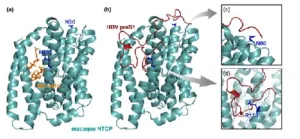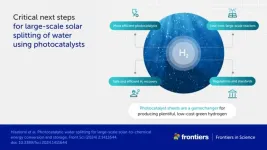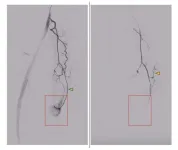(Press-News.org) 3 December 2024 – EMBO announces the selection of 27 life scientists as the newest members of the EMBO Young Investigator Programme. The programme supports young group leaders in Europe and beyond. The new young investigators will start in January, be active members of the programme for four years, and become part of an international network of nearly 800 current and former EMBO Young Investigators, Installation Grantees and Global Investigators. They carry out research across a wide range of life sciences topics from cell and computational biology to immunology and neuroscience.
"EMBO welcomes the new young investigators, a group of exceptional scientists who represent innovation and excellence in their fields. The multidisciplinary EMBO Young Investigator Network that they will join generates many opportunities for forming connections. We are delighted to support this next generation of scientific leaders and the collaborations they will form,” says EMBO Director Fiona Watt.
Networking opportunities for EMBO Young Investigators and their lab members are central to the programme. The young investigators, who receive an award of 15,000 euros, also benefit from training in laboratory leadership and responsible conduct of research, access to core facilities at EMBL in Heidelberg, Germany, and mentoring by EMBO Members. They can apply for additional grants, for example for organizing or travelling to conferences.
Of the 27 new EMBO Young Investigators, 14 are female (52%) and 13 are male (48%). They are based in 10 member states of the EMBC, the intergovernmental organization that funds the EMBO Programmes, and Japan. In total, the programme received 207 eligible applications, and the success rate was 13%. In the framework of the memorandum of cooperation between EMBO and the Japan Science and Technology Agency (JST), scientists funded by certain programmes of JST were eligible apply to the EMBO Young Investigator Programme for the first time in 2024.
The next deadline for applications is 1 April 2025. More information about the programme, including eligibility criteria and the application process, is available online.
New EMBO Young Investigators
Name
Research project
Affiliation
Location
Ilary Allodi
Understanding the role of neural circuit dysfunctions in ALS-FTD pathophysiology
University of St Andrews
St Andrews, UK
Benedetta Artegiani
Enlightening brain and liver biology and disease with novel human-based models
Princess Máxima Center for Pediatric Oncology
Utrecht, NL
Thibaut Brunet
Evolutionary origin of animal morphogenesis
Institut Pasteur
Paris, FR
Johan Decelle
Structural and metabolic connection in planktonic cell-cell symbioses
Université Grenoble Alpes
Grenoble, FR
Gautam Dey
Evolutionary cell biology of mitosis and nuclear remodelling
EMBL Heidelberg
Heidelberg, DE
Basil Greber
Structure and function of DNA repair assemblies and cyclin-dependent kinases
The Institute of Cancer Research
London, UK
Itamar Harel
Experimental biology of vertebrate aging and age-related diseases
The Alexander Silberman Institute of Life Sciences
Jerusalem, IL
Katharina Höfer
Bacterial epitranscriptomics
Max Planck Institute for Terrestrial Microbiology
Marburg, DE
Momoko Ikeuchi
Self-organization of plant cells during organ regeneration
Nara Institute of Science and Technology
Nara, JP
Claudia Keller Valsecchi
Gene dosage and sex differences
Institute of Molecular Biology
Mainz, DE
Charlotte Kirchhelle
From edge to organ: how plants shape organs
National Research Institute for Agriculture, Food and Environment
Lyon, FR
Eva Kummer
Mitochondrial genome maintenance and gene expression
University of Copenhagen
Copenhagen, DK
Felix Leroy
Neuronal circuits supporting cognition and social interactions in the mouse
Instituto de Neurociencias
San Juan de Alicante, ES
Gabriel Neurohr
Cell size and crowding homeostasis
ETH Zurich
Zurich, CH
Mor Nitzan
Representation, inference and design of multicellular systems
Hebrew University
Jerusalem, IL
Sylvie Noordermeer
DNA double-strand break repair pathways in health and disease
Leiden University Medical Center
Leiden, NL
Tomáš Pluskal
Decoding the chemical universe of plants
Institute of Organic Chemistry and Biochemistry
Prague, CZ
Lucia Prieto-Godino
Mechanisms of neural circuit evolution: from molecules to networks
The Francis Crick Institute
London, UK
Julia Qüesta
Epigenetic mechanisms underlying plant developmental transitions
Centre for Research in Agricultural Genomics
Barcelona, ES
Johannes Rebelein
Microbial metalloenzymes: characterizing and engineering microbial nitrogenases
Max Planck Institute for Terrestrial Microbiology
Marburg, DE
Erdinc Sezgin
Restoring immune fitness through biophysical manipulations
Karolinska Institutet
Solna, SE
Marta Shahbazi Alonso
Mechanisms of self-organization in the early mammalian embryo
MRC Laboratory of Molecular Biology
Cambridge, UK
Ralph Stadhouders
Molecular mechanisms underlying lymphocyte memory and dysfunction
Erasmus University Medical Center
Rotterdam, NL
Teresa Thurston
Host pathogen interactions and innate immune signaling
University of Oxford
Oxford, UK
Agnes Toth-Petroczy
Protein plasticity and evolution
Max Planck Institute of Molecular Cell Biology and Genetics
Dresden, DE
Florian Wilfling
Deciphering autophagosome assembly and cargo selection using correlative cryo-ET
Max Planck Institute of Biophysics
Frankfurt, DE
Simone Zaccaria
Investigating metastatic cancer evolution at single-cell whole-genome resolution
University College London
London, UK
END
Twenty-seven scientists become EMBO Young Investigators
2024-12-03
ELSE PRESS RELEASES FROM THIS DATE:
The viral puzzle of why humans are susceptible to hepatitis B virus, but monkeys are not!
2024-12-03
Hepatitis B virus (HBV) infection is a leading cause of chronic liver diseases, that spreads among individuals through blood or body fluids. According to the World Health Organization, globally 1.2 million new HBV infections are reported every year. Caused by the HBV, these infections are limited to a few species, including humans and chimpanzees. Despite their close evolutionary relationship with these animals, old-world monkeys are not susceptible to HBV infections. In a new study published in Nature Communications on October 25, 2024, scientists including Dr. Kaho Shionoya from the Tokyo University of Science, Dr. Jae-Hyun Park, Dr. Toru Ekimoto, Dr. Mitsunori Ikeguchi, and Dr. Sam-Yong ...
Microfiber plastics appear to tumble, roll and move slowly in the environment
2024-12-03
PULLMAN, Wash. -- The first-known direct observations of the movement of microfiber plastics through a thin layer of soil-like particles show that they tend to tumble, roll and sometimes get stuck in spaces.
The findings, reported in the journal, Water Resources Research, mean that the fibers could get easily trapped in sediment. The work helps to improve understanding of the exposure risks and possible health impacts of the pervasive pieces of plastic, which are the largest pollutant in the world by mass.
“The ...
Prestigious EU research grants awarded to two Hebrew University researchers
2024-12-03
The Hebrew University of Jerusalem proudly congratulates two of its esteemed researchers for receiving prestigious European Research Council (ERC) grants. These grants, each valued at approximately 2 million euros, are awarded to researchers leading innovative projects and join a long tradition of Hebrew University scholars who have been recognized with this honor in previous years.
The recipients from Hebrew University are:
Prof. Dina Schneidman, The Rachel and Selim Benin School of Computer Science and Engineering, for her research titled "Deep Learning for Structure-Based Discovery of Adaptive Immune Receptors." Prof. Schneidman’s research ...
Experts reveal how revolutionary technological advances could use the sun to source hydrogen fuel
2024-12-03
In the future, we could fuel the world with sunlight and water – using sunlight to derive hydrogen fuel from H2O. Currently, most hydrogen that’s used as feedstock and fuel is derived from natural gas, and therefore doesn’t help us cut out fossil fuels. But Japanese scientists are leading the way towards a future powered by hydrogen, with new, easily-manufactured photocatalytic sheets and a proof-of-concept panel reactor which shows that it is possible to refine hydrogen fuel from water at scale.
“Sunlight-driven water splitting using photocatalysts is an ideal technology for solar-to-chemical ...
Muscle loss could increase dementia risk
2024-12-03
CHICAGO – Skeletal muscle loss is a risk factor for developing dementia, according to a study being presented today at the annual meeting of the Radiological Society of North America (RSNA).
Skeletal muscles make up about one-third of a person’s total body mass. They are connected to the bones and allow for a wide range of movements. As people grow older, they begin to lose skeletal muscle mass.
Because age-related skeletal muscle loss is often seen in older adults with Alzheimer’s disease (AD) dementia, this study aimed to examine whether temporalis muscle ...
Minimally invasive procedure relieves knee arthritis
2024-12-03
CHICAGO – A minimally invasive procedure provides significant relief from knee pain and may prevent the need for knee replacement surgery in people with osteoarthritis, according to a study being presented this week at the annual meeting of the Radiological Society of North America (RSNA).
“This study addresses osteoarthritis, which is a significant public health issue and the leading cause of chronic pain and disability worldwide,” said the study’s lead author, Florian Nima Fleckenstein, M.D., interventional radiologist at Charité – University Hospital Berlin in Germany. “With millions of people affected by knee ...
Scientists question the use of “tipping point” metaphor in climate change discussions
2024-12-03
A group of scientists, including researchers from Rutgers University-New Brunswick, Princeton University and Carleton University, has questioned the accuracy and utility of the metaphor “tipping point” in calling attention to the threat of climate change.
The phrase, while perhaps initially useful as a clarion call that warns about sudden, drastic changes, may now be confusing the public and impeding action, researchers said.
Writing a perspective in Nature Climate Change, the scientists, from the Rutgers Climate and Energy Institute, Princeton’s Center ...
Ecosystems: New study questions common assumption about biodiversity
2024-12-03
Plant species can fulfil different functions within an ecosystem, even if they are closely related to each other. This surprising conclusion was reached by a global analysis of around 1.7 million datasets on plant communities. The study was led by Martin Luther University Halle-Wittenberg (MLU) and the University of Bologna. Their findings overturn previous assumptions in ecology. The study was published in "Nature Ecology & Evolution" and offers insights for nature conservation.
When ...
DNA secreted by tumor cell extracellular vesicles prompts anti-metastatic immune response
2024-12-03
Specially packaged DNA secreted by tumor cells can trigger an immune response that inhibits the metastatic spread of the tumor to the liver, according to a study led by researchers at Weill Cornell Medicine, Memorial Sloan Kettering Cancer Center and Korea’s Yonsei University. The discovery improves the scientific understanding of cancer progression and anticancer immunity, and could yield new clinical tools for assessing and reducing metastasis risk.
In the study, reported Dec. 3 in Nature Cancer, the researchers examined cancer cells’ secretion of short stretches of DNA packaged on tiny capsules called extracellular ...
Countdown to an ice-free Arctic: New research warns of accelerated timelines
2024-12-03
The first summer on record that melts practically all of the Arctic’s sea ice, an ominous milestone for the planet, could occur as early as 2027.
For the first time, an international research team, including University of Colorado Boulder climatologist Alexandra Jahn and Céline Heuzé from the University of Gothenburg in Sweden, used computer models to predict when the first ice-free day could occur in the northernmost ocean. An ice-free Arctic could significantly impact the ecosystem and Earth’s climate by changing weather patterns.
“The first ice-free day in the Arctic won’t change things dramatically,” ...






